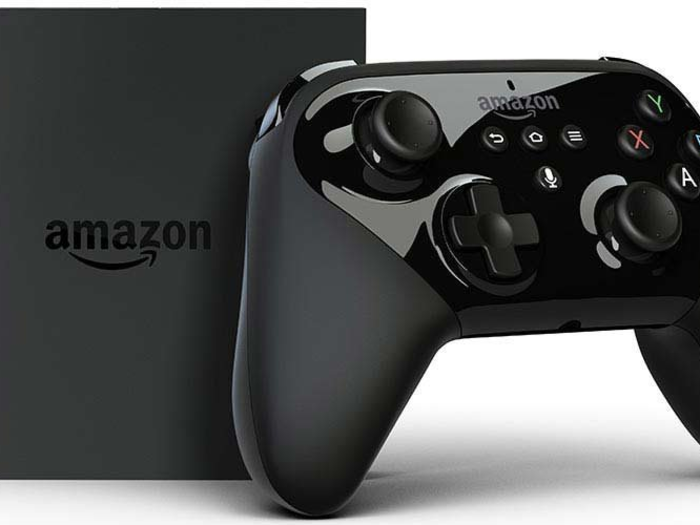
Amazon's already a major video game retailer, and it operates the largest video game livestreaming service in the world with Twitch.
The company's next move into gaming, though, is even more ambitious: Amazon is working on a Netflix-like service for playing games, according to a report from The Information.
The new service from Amazon will reportedly allow players to stream games rather than having to buy and download individual titles. The company is said to be discussing potential games for the new service with game publishers, but it sounds like plans are still early; the streaming service isn't expected to arrive until 2020 "at the earliest."
Amazon has yet to officially announce such a service, and a representative didn't return a request for comment.
But even without official confirmation or an announcement, multiple jobs listings originally spotted by The Verge point to Amazon building just such a service. One such listing even explicitly says, "This is a rare opportunity to take a technical leadership role to shape the foundation of an unannounced AAA games business."
So, why Amazon?
It's one of the few tech companies with a cloud computing infrastructure already in place, worldwide, to pull off such a challenging technological issue. It's called "Amazon Web Services" (AWS for short), and it's the type of infrastructure required to pull off video game streaming on a mainstream consumer scale.

Verizon? Like the company that you pay for smartphone service? Yes, that Verizon is reportedly working on a service that's thrillingly named, "Verizon Gaming."
Early testers were sent an Nvidia Shield set-top box, a wireless Xbox One gamepad, and software that gave them access to the Verizon Gaming service.
Images of the service show a surprisingly large library of games that are otherwise only available on game consoles, such as the PlayStation 4's 2018 blockbuster "God of War." Verizon has yet to officially announce such a service, nor is there a release date.

Like Verizon, Apple has yet to officially announce its video game streaming service.
Also like Verizon, news of the service leaked regardless — Cheddar reports that the service from Apple could, like Netflix, be subscription-based. The report also notes that the project is "in the early stages," and could very well get canned like other internal Apple projects that never launched.
Given that Apple already has a set-top box in households all over the world with the Apple TV — to say nothing of iPhones and iPads — such a service doesn't seem like a stretch.
The big question is content: It might be tough for Apple to convince people to subscribe to the service if it only offers games from the App Store, so Apple will likely have to work with established game publishers to bring in more games.

Near the end of 2018, and for much of January 2019, Google ran a limited test for its video game streaming service. That service, fittingly enough, is named "Project Stream."
During the test, users could play 2018's "Assassin's Creed Odyssey" for free in a browser tab on their computer. You could even use a Bluetooth controller to control the game.
It was little more than a proof of concept test, and it confirmed that — yes — Google's service is indeed capable of streaming a blockbuster game to a web browser. It was impressive, easy to use, and quick.
That test ended, and it's not clear what's next for the service. Google has yet to make any official announcements about the future of Project Stream (if one exists). What is clear is that Project Stream actually works, which is more than can be said for many video game streaming services before it.

With "Project xCloud," Microsoft is creating its own game streaming service. And, in 2019, the service goes public.
The company demonstrated its service in a video released in October 2018:
The concept is a bit more Microsoft-centric than the rest of the group, and there's a good reason for that: Microsoft's Xbox group.
"We have as much a shot to build a subscription service as anybody else," Microsoft CEO Satya Nadella told journalists at an invitational editors' meeting at Microsoft's headquarters in late January.
Nadella says Microsoft has the upper hand with its Xbox gaming arm, which gives the company a strategic advantage that much of the competition is lacking.
"We have a huge back catalog, which is: We have our own games," he said, referring to the Microsoft-published back catalog of games on the Xbox that includes "Halo," "Forza," and much more.
Microsoft promised "public trials" of Project xCloud in 2019, but has yet to give specific dates; it's otherwise testing the service privately on an invite-only basis.

Sony, meanwhile, has been operating a subscription-based video game streaming service in PlayStation Now for five years.
The service enables players on PlayStation 4 and PC to stream PlayStation 2, 3, and 4 games without a download. It costs $20/month or $100/year.
PlayStation Now hasn't made a major splash despite being the only service that's widely available to consumers right now. The reasons for that are complex and varied, but its limitations and high price are two main factors.
If the promise of game streaming is to bring your games to any device, PlayStation Now fails to do that. It offers a slightly-aged library of games on devices that are capable of playing brand new games.
The true promise of the "Netflix for gaming" is brand new games as part of a vibrant, rotating library — like Netflix does.
 Impact Player rule has disrupted balance of game: Virat Kohli
Impact Player rule has disrupted balance of game: Virat Kohli
 Markets end special trading session with gains
Markets end special trading session with gains
 Nepal bans sale of Indian spice-mix products over quality concerns
Nepal bans sale of Indian spice-mix products over quality concerns

Copyright © 2024. Times Internet Limited. All rights reserved.For reprint rights. Times Syndication Service.